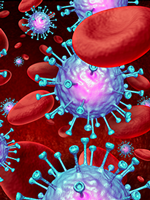Immunotherapy
The second-generation chimeric antigen receptor (CAR) T-cell therapy, bb2121, engineered to target B-cell maturation antigen, a protein on the surface of certain myeloma cells, displayed continuing efficacy and safety in an update of a phase 1 clinical trial in patients with relapsed or refractory multiple myeloma.
Read More ›Among the 84 patients, 7 had partial responses with the combination of atezolizumab (Tecentriq) and cobimetinib (Cotellic). The median duration of response was 14.3 months.
Read More ›The combination cohort consisted of 119 patients who received nivolumab 3 mg/kg plus ipilimumab 1 mg/kg every 3 weeks for 4 doses followed by nivolumab 3 mg/kg every 2 weeks. The median follow-up was 13.4 months.
Read More ›“We find that T-cells with highly activated glycolysis pathways ended up performing worse when we tried to make them into CAR T-Cells. Substituting and supplementing heavily with fatty acids did seem to improve this a little,” said David M. Barrett, MD, PhD, at the 2018 American Association for Cancer Research annual meeting.
Read More ›“The main rationale from the cytotoxic era is to increase efficacy by combining agents that have different mechanisms and nonoverlapping toxicities. The question is whether we can replace nonspecific cytotoxic agents with a specific, more effective immunotherapeutic,” said Donna Przepiorka, MD, PhD, at ASH 2017.
Read More ›






